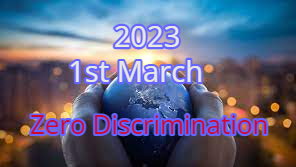News
Zero Discrimination Day 2023 held on 1st March
Published
1 year agoon

On March 1, Zero Discrimination Day, we honour everyone’s right to a life that is both full and productive and one that is also lived with dignity
Zero Discrimination Day 2023.
On Zero Discrimination Day, March 1, we commemorate everyone’s right to a full and productive life, lived with dignity. Zero Discrimination Day emphasises how individuals may learn about and promote inclusiveness, compassion, peace, and, most importantly, a movement for change. Zero Dicrimnation Day is assisting in the creation of a worldwide solidarity movement to abolish all forms of prejudice.
Discrimination on the basis of race, gender, sexual orientation, age, religion, handicap, or any other aspect violates human rights and fosters poverty and inequality. Every year the day is observed with a theme specific to it.
Theme for Zero Discrimination Day 2023.
The United Nations Programme on HIV/AIDS (UNAIDS) is emphasising how the decriminalisation of important communities and individuals living with HIV saves lives and advances the end of the AIDS pandemic on this year’s Zero DicrimnationDay under the subject “Save lives: Decriminalise.”
The Importance of Zero Dicrimnation Day
Zero Discrimination Day is marked to encourage inclusivity, tolerance, and equality everywhere. The purpose of the day is to draw attention to how crucial it is to get rid of prejudice based on things like colour, gender, sexual orientation, age, religion, and disabilities.
The effects of discrmnation on people, communities, and society are significant. It fosters poverty and inequality, violates human rights, puts up hurdles to accessing healthcare, education, and employment opportunities.
History of Zero Discrimintion Day.
On World AIDS Day in 2014, UNAIDS Director-General Michel Sidibe created Discriminaton Day, with a major event in Beijing backed by the Chinese government, civil society, and celebrities, as well as the China Red Ribbon Foundation and Hanergy Holding Group. In the days preceding up to March 1, 2014, similar demonstrations were planned in nations all across the world.
Read Also:- India v/s Australia 3rd Test
Regardless of one’s appearance, origin, or sexual inclination, everyone has the right to live a complete life with dignity, and the goal of Discrmination Day is to motivate people throughout the world to promote and celebrate this right. The butterfly, which is seen as a symbol of change, is the emblem of Zero Discrimination.
about
- UNAIDS Headquarters: Geneva, Switzerland;
- UNAIDS Founded: 26 July 1994;
- UNAIDS Founder: Peter Piot;
- UNAIDS Executive director: Winnie Byanyima.
About Zero Discrimination Day
On March 1, Zero Discrimination Day, we honour everyone’s right to a full and productive life—and a life lived with dignity. The purpose of Zero Discrimination Day is to raise awareness of and encourage inclusiveness, compassion, peace, and, most importantly, a movement for change.
What is meant by Zero Discrimination Day?
To emphasise how individuals may raise awareness of and support the rights of those impacted by and living with HIV, the first Zero Discrimination Day focused on HIV. The goal has shifted in recent years to include eliminating all types of prejudice that negatively affect quality of life, health, and wellbeing.
Who started Zero Discrimination Day?
Zero Discrimination Day, in the words of UNAIDS, “is assisting in the creation of a worldwide movement of solidarity to eradicate all forms of prejudice.” Zero Discrimination Day was first observed in 2013 by Michel Sidibé, who was then the executive director of UNAIDS, and was celebrated with a sizable ceremony in Beijing.
What is discrimination law in India?
It is to be noted that the Constitution of India, via Article 15, prohibits discrimination on the grounds of religion, race, caste, sex, or place of birth
What are types of discrimination?
- Dicrimination Types
- Age-based prejudice.
- Discrimination based on disability.
- Sexual Attitude.
- Parental status.
- discrimination due to religion.
- Country of origin.
- Pregnancy.
- Sexual exploitation.
